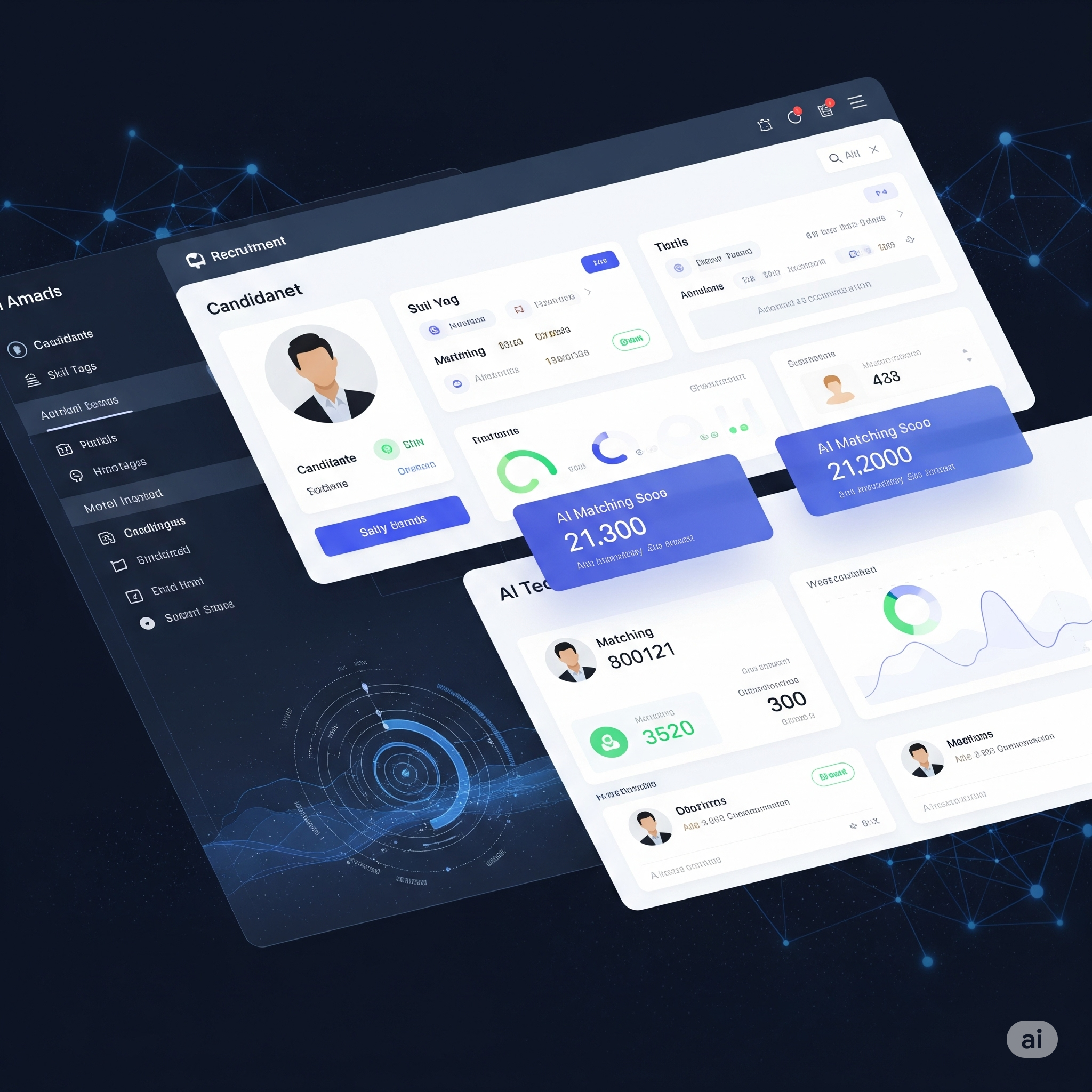In today’s competitive talent landscape, attracting and securing the best candidates can be a daunting and time-consuming task. Traditional recruitment processes often involve sifting through countless resumes, manually screening applications, and battling unconscious biases. However, a new era of efficiency and effectiveness has dawned with the rise of AI recruitment software. This innovative technology is revolutionizing how organizations source, engage, and evaluate talent, allowing HR teams to focus on strategic initiatives and ultimately build stronger, more agile workforces.
This comprehensive guide will delve into the transformative power of AI recruitment software, exploring its capabilities in automating candidate sourcing and screening. We will examine the practical applications, benefits, and real-world examples of how businesses are leveraging these intelligent tools to streamline their hiring processes and gain a significant competitive advantage. Furthermore, we will touch upon the critical role of candidate screening AI in ensuring fair and objective evaluations.
The Evolving Landscape of Talent Acquisition: Embracing AI
The challenges faced by modern HR departments are multifaceted. The volume of applications for open positions can be overwhelming, the need to quickly identify qualified candidates is paramount, and the desire to create a diverse and inclusive workforce is stronger than ever. AI recruitment software offers a powerful solution to these challenges by automating repetitive tasks, providing data-driven insights, and enhancing the overall efficiency of the recruitment lifecycle.
At its core, AI recruitment software leverages artificial intelligence and machine learning algorithms to analyze vast amounts of data related to job requirements, candidate skills, and organizational needs. This allows recruiters to move beyond manual processes and embrace a more strategic and data-informed approach to talent acquisition. The integration of candidate screening AI further enhances this process by providing objective and consistent evaluations of candidate qualifications.
Intelligent Sourcing: Finding the Right Talent, Faster
One of the most significant impacts of AI recruitment software is in the realm of candidate sourcing. Traditionally, recruiters would spend countless hours posting jobs on various platforms, searching through job boards, and networking to identify potential candidates. AI-powered sourcing tools can automate much of this process, dramatically expanding the reach and efficiency of talent acquisition efforts.
Automated Job Posting and Distribution
AI recruitment software can automatically post job openings to relevant job boards, social media platforms, and even niche industry websites, ensuring maximum visibility to potential candidates. These tools can also optimize job descriptions for search engines, increasing the likelihood of attracting qualified applicants. Furthermore, some AI recruitment software can even proactively identify passive candidates – individuals who may not be actively looking for a job but possess the skills and experience that align with open roles – by analyzing their online profiles and professional activities. This proactive sourcing capability significantly expands the talent pool beyond active applicants.
AI-Powered Candidate Outreach and Engagement
Beyond simply finding candidates, AI recruitment software can also assist in engaging them. AI-powered chatbots can interact with potential candidates, answering their initial questions about the company and the role, providing information about the application process, and even scheduling preliminary conversations. This automated engagement ensures that candidates receive timely responses and a positive initial experience, even before interacting with a human recruiter. This efficient communication, often powered by sophisticated candidate screening AI insights, helps to nurture candidate interest and build a strong talent pipeline.
Streamlined Screening: Identifying Top Candidates Efficiently
Once a pool of candidates has been sourced, the next critical step is screening and evaluation. This is another area where AI recruitment software, particularly candidate screening AI, offers significant advantages.
Resume and Application Analysis
AI recruitment software can intelligently analyze resumes and applications, extracting key information such as skills, experience, education, and qualifications. Unlike traditional keyword-based screening, AI algorithms that power candidate screening AI can understand the context of the information, identify transferable skills, and even assess the strength of a candidate’s accomplishments based on the language used in their application materials. This allows recruiters to quickly identify the most promising candidates who meet the essential requirements of the role, saving significant time and effort compared to manual resume review.
Skills Assessment and Behavioral Analysis
Some advanced AI recruitment software incorporates features for automated skills assessment and behavioral analysis. AI-powered platforms can administer online tests and assessments to evaluate candidates’ technical skills, problem-solving abilities, and cognitive aptitude. Furthermore, candidate screening AI can analyze video interviews or written responses using natural language processing and sentiment analysis to gain insights into a candidate’s communication style, personality traits, and potential cultural fit within the organization. These objective assessments provide valuable data points to inform hiring decisions and reduce the potential for unconscious bias.
Case Studies: Real-World Impact of AI in Recruitment
The adoption of AI recruitment software is yielding significant results for organizations across various industries. Let’s explore a couple of compelling case studies:
Case Study 1: PepsiCo’s Efficiency Gains with AI
PepsiCo, a global food and beverage leader, implemented AI recruitment software to streamline its high-volume hiring processes. Faced with a large number of applications for various roles, their HR team sought a solution to automate initial screening and improve the efficiency of their recruitment cycle. By leveraging AI-powered tools for resume analysis and candidate matching, PepsiCo significantly reduced the time spent on manual screening, allowing their recruiters to focus on engaging with top-tier candidates and building stronger relationships. This adoption of AI recruitment software not only accelerated their hiring process but also improved the quality of their hires by ensuring a more data-driven and objective evaluation of candidate qualifications. Their internal data reportedly showed a significant reduction in time-to-hire and cost-per-hire after implementing these AI-powered solutions.
Case Study 2: Intel’s Focus on Diversity with AI-Driven Screening
Intel, a leading technology company, recognized the importance of diversity and inclusion in its workforce. To mitigate unconscious bias in their recruitment process, they adopted AI recruitment software with a strong emphasis on candidate screening AI. By using AI algorithms to anonymize candidate applications during the initial screening phase and focus solely on skills and experience, Intel aimed to create a more level playing field for all applicants. The AI tools helped to identify qualified candidates from a wider range of backgrounds who might have been overlooked in traditional screening processes. This commitment to leveraging AI recruitment software for unbiased evaluation not only supported Intel’s diversity goals but also led to the identification of highly skilled talent from previously untapped sources, ultimately strengthening their innovation and competitiveness.
Beginner-Friendly Tips for Implementing AI Recruitment Software
Adopting AI recruitment software can seem like a significant undertaking, but here are some beginner-friendly tips to guide your organization:
- Identify Your Biggest Recruitment Bottlenecks: Determine the areas of your current recruitment process that are most time-consuming or inefficient. Is it sourcing candidates? Screening applications? Scheduling interviews? Focus on implementing AI solutions that directly address these pain points.
- Start with a Pilot Program: Instead of a full-scale rollout, begin with a pilot program in one department or for a specific type of role. This allows you to test the AI recruitment software, gather feedback, and refine your implementation strategy before wider adoption.
- Integrate with Existing HR Systems: Ensure that the AI recruitment software you choose can seamlessly integrate with your current HR technology stack, such as your applicant tracking system (ATS) and other HR management tools. Integration is key to a smooth and efficient workflow. Tools like Zapier can often facilitate these integrations.
- Focus on User Training and Adoption: Provide comprehensive training to your HR team on how to use the AI recruitment software effectively. Emphasize the benefits of the technology and address any concerns or resistance to change. Successful adoption is crucial for realizing the full potential of the software.
- Monitor Performance and Iterate: Continuously track key recruitment metrics, such as time-to-hire, cost-per-hire, and quality of hire, after implementing AI recruitment software. Use these data points to evaluate the effectiveness of the technology and identify areas for further optimization.
- Prioritize Ethical Considerations: When implementing candidate screening AI, ensure that the algorithms are fair, unbiased, and compliant with relevant regulations. Regularly audit the AI’s performance to identify and address any potential biases. Transparency with candidates about how AI is being used in the recruitment process is also important, aligning with guidelines from organizations like OpenAI regarding responsible AI development and deployment.
The Strategic Advantage of AI in Talent Acquisition
AI recruitment software is no longer a futuristic concept; it’s a vital tool for organizations looking to gain a strategic advantage in the war for talent. By automating time-consuming tasks such as sourcing and initial candidate screening AI, these intelligent platforms free up recruiters to focus on more strategic activities, such as building relationships with top candidates, understanding their motivations, and ensuring a positive and engaging candidate experience. This shift towards a more human-centric approach, empowered by AI, ultimately leads to better hiring decisions, a more efficient recruitment process, and a stronger, more competitive workforce. As the technology continues to evolve, AI recruitment software will undoubtedly play an increasingly critical role in shaping the future of talent acquisition.
The Future of AI Music Composition: Unlocking Limitless Creativity in Sound
The Future of AI Video Production: Streamlining Editing and Special Effects



